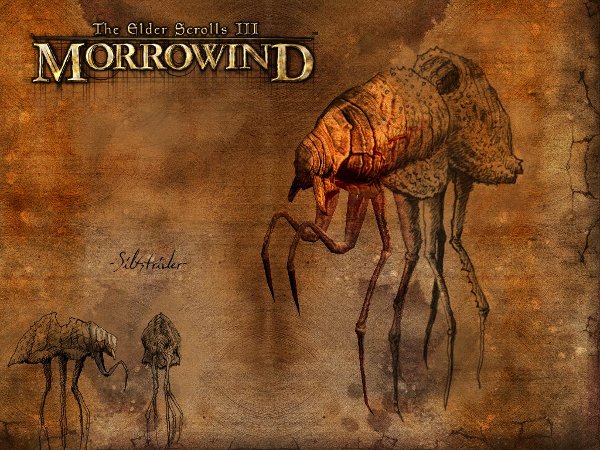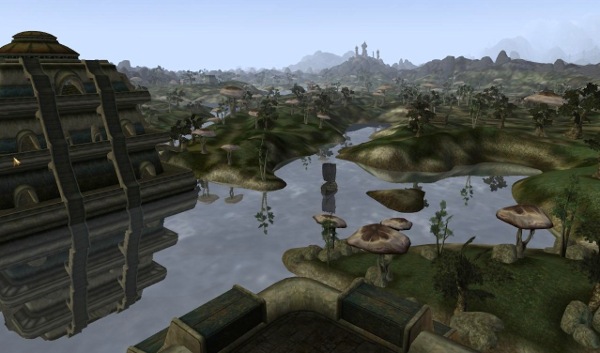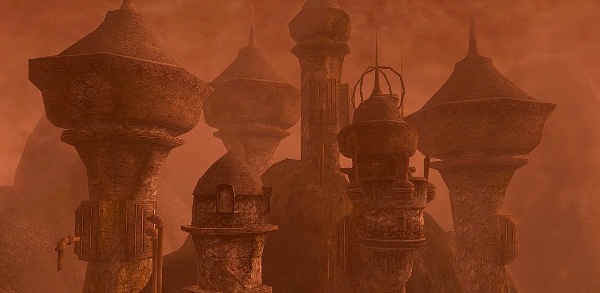This post has not been edited by the GamesBeat staff. Opinions by GamesBeat community writers do not necessarily reflect those of the staff.
 With the announcement of The Elder Scrolls 5: Skyrim and some gentle prodding from Bitmob staffer Jeff Grubb, I decided now was a good time to put down in words something that I've felt strongly about for a number of years. I played Oblivion for just shy of 100 hours, starting on the day it came out — I had been frothing at the mouth to get my hands on it, since Morrowind was, and still remains, my favorite game of all time. I enjoyed Oblivion while I played, but my memory of it has since soured. I can't say the same for Morrowind.
With the announcement of The Elder Scrolls 5: Skyrim and some gentle prodding from Bitmob staffer Jeff Grubb, I decided now was a good time to put down in words something that I've felt strongly about for a number of years. I played Oblivion for just shy of 100 hours, starting on the day it came out — I had been frothing at the mouth to get my hands on it, since Morrowind was, and still remains, my favorite game of all time. I enjoyed Oblivion while I played, but my memory of it has since soured. I can't say the same for Morrowind.
Oblivion has a well-known and fundamental flaw: Because the world levels up with the player, you can never, ever be more or less powerful than the enemies in the game (well, at least not without some seriously tedious min/maxing). And as soon as you hit level 20 every roving troupe of bandits comes equipped with matching sets of glass or Daedric armor. Morrowind has two full sets of glass armor in the entire game (both worn by fairly high-level NPCs in an obscure guardhouse in the middle of the Ashlands). Simply finding these items should be special; what's the fun if every enemy you encounter has your same powerful equipment?
Anyway, due to this game-breaking leveling system, it's entirely possible (and by some accounts, easier) to beat Oblivion without rising a single level. In effect, the only reason to explore the world, undertake side quests, or engage in any other activities normally associated with Western RPGs (and which should form the backbone of Oblivion) is to discover the places, stories, and people that lie within. Some might say that this is incentive enough, given the scope of Oblivion's environments, but it's in this area that Oblivion absolutely pales in comparison to Morrowind. More than pales…it becomes transparent.

To me, the land of Morrowind begs to be explored more than any other game world ever conceived. I don't even know where to begin. Maybe with the sprawling cities, each unique; one built within the shell of a gargantuan crab, another out of clusters of magically grown fungi. Maybe the island itself; its swampy coastlines (you can practically smell the tepid waters), craggy mountains, lush meadows, and, at the center, the deadly Ashlands and Red Mountain, where a fallen god constructs a monster and waits for your arrival.
Keep your stupid horses — in Morrowind, silt striders (giant fleas, basically) wait for hire at the gates to many towns. But why bother with that when, if you have the knowledge, you can simply buff your athleticism until you can cross half the continent in a single leap? Once you reach your destination, you can pick the locks, kill the guards and take their keys, or simply levitate to the top of the tower and confront whatever awaits you there.
Morrowind is filled to the brim with a mind-boggling number of secrets, nooks and crannies to explore, legendary artifacts to unearth, secret tombs hidden deep within undersea caverns, and mad hermits sequestered at the tip-tops of dangerous, abandoned ruins.

There are ancient robots, tribes of vampires (joining their secretive ranks, or even encountering them at all, is so unlikely that I went hundreds of hours without ever doing so), and even self-made gods cowering within elaborate temples, waiting for you to reach them by any number of means. Once you do, you can worship them, murder them (not an easy feat), or, with a near-impossibly powerful domination spell, lure them to your stronghold and make them your slave forever.
Even the little things, like Morrowind's narcotics (skooma, derived from refined moon sugar, is like heroin, especially for the game's cat-like Khajiit race), are barely recognizable from a real-world perspective yet totally compelling. The choices players must make at every single turn are barely describable, and simply can't be appreciated by anyone who hasn't poured dozens, if not hundreds, of hours into exploring every aspect of the game.
Just about every object in the game can be picked up, manipulated, sold, dropped, stolen, stored, or displayed, and the number of available weapons, worn items, spells, skills, and enchantment greatly exceed what Oblivion offers. The obvious argument is that sometimes, simple is better, but not so in the case of The Elder Scrolls. In Morrowind, you can forge a sword that does fire damage, breaks your enemy's weapon, and allows you to breath underwater — or walk on water, or levitate — as long as you're holding it. You can create a staff that turns you invisible, allows you to pick locks, and makes you more persuasive as well.
You can pander to your quest-givers and complete every task in the hopes of one day fulfilling the prophecy and meeting your destiny, or you can take matters into your own hands: ignore their instructions, murder everyone who looks at you funny, and, if you're thorough, complete the game anyway. It's possible to break any quest, including the main one, by killing a key NPC or selling an important item, but that's part of the fun. Even when that happens, there is often a way around what you've done (though it's rarely simple).
I'll concede only one point: The game starts slowly. Movement is unbearably sluggish, and the simple act of striking an enemy with a sword or successfully casting a rudimentary spell can be nearly impossible for a new player. But a few hours in, with a few levels and stat points, and these problems evaporate — leaving a setting more vivid and rewarding than any other game world before or since.
It's all there, waiting to be discovered. You have an infinite number of ways to play, thousands of options to explore, and, maybe best of all, the world is receptive to you. It reacts to you. It knows you're there, and offers consequences to your actions.
![]()
I can't say the same for Oblivion. Every town looks the same but with slightly differently colored tiles on the roofs. Its miles of forest are mostly empty save the half-tame beasts (bears? boar? deer? try guar, alit, and cliff racers); animals that are never quite powerful enough to kill you, even when you're level 1. You drink wine and ale instead of sujamma and mazte. You store your belongings in a cottage you purchased rather than in the house of the shopkeeper you murdered (so he would ask no questions as you rummaged through his stores) or the giant mushroom your Telvanni spellcaster cohorts grew for you.
Oblivion is, in a single word, generic. It is utterly, inexcusably, deplorably generic. It's even more inexcusable because of the genius of Morrowind, and it's deplorable for what it's done to the public's perception of RPGs. Without a doubt,Oblivion was an absolute smash hit, and there's no hope in my mind that Bethesda will ever return to the thoughtful, imaginative, and, unfortunately for those who know what a great game really is, risky style of Morrowind.
Yeah, I probably won't play Skyrim.
